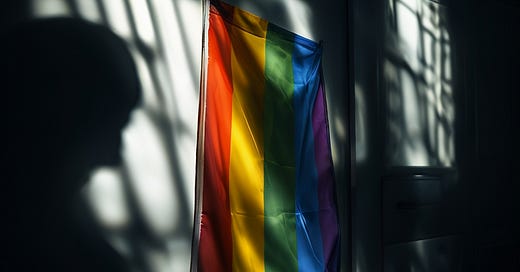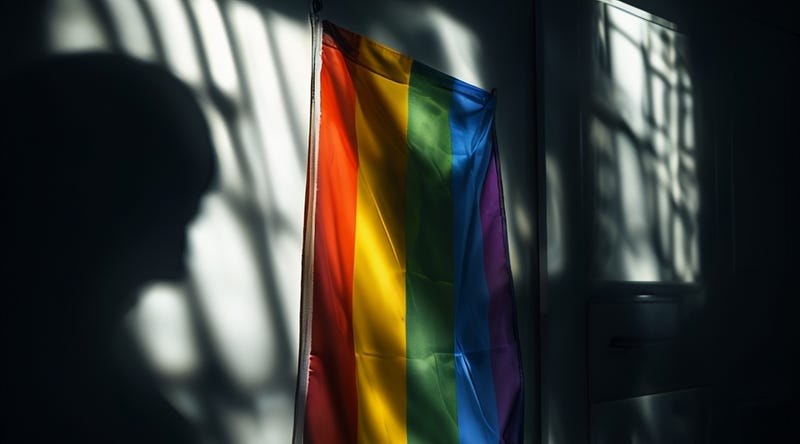How Religious Exemptions Let a Conversion ‘Therapist’ assault Gay Mormons
This is a dark truth behind Utah’s conversion-therapy ban loophole
This is a dark truth behind Utah’s conversion-therapy ban loophole
Content warning: This article discusses conversion therapy and sexual abuse in therapeutic settings.
At 22, Andrew walked into what he believed was a life-saving therapy session. His LDS (Mormon) bishop had just referred him to Scott Owen, a therapist known for helping gay church members. Instead of finding help, Andrew entered a nightmare of sexual abuse that would take nearly a decade to uncover.
This week, Owen pleaded guilty to sexually abusing multiple clients.
But the story behind his plea reveals something more disturbing: how Utah’s religious exemptions for mental-health counseling created conditions for predators.
The Ideal Hunting Ground
A hidden crisis has been developing in Utah’s LDS communities:
Young gay members facing challenges with their sexuality
Church leaders referring them to “experts”
Religious exemptions for discredited conversion therapy
A culture of silence shielding abusers
Owen built his practice on this fertile ground.
For 20 years, he marketed himself as someone who could help gay Mormon men “overcome” their sexuality. Every major medical association condemns this claim as dangerous pseudoscience.
Owen’s victims were ideal targets:
Young
Religiously committed
Desiring acceptance
Often funded by the church
“This Was Supposed to Be My Miracle”
Andrew (name changed for privacy) became Owen’s patient in 2015. He was one of the first victims to report the abuse, and his story helped reveal Owen’s predation pattern.
At 22, after completing an LDS mission trip, Andrew was wrestling with being gay in a faith that doesn’t accept same-sex relationships. Like many young Mormon men, he sought guidance from his bishop.
The timing was ideal: his bishop had just received a referral for Owen, who claimed expertise in helping gay church members.
Owen co-owned Canyon Counseling in Provo and held a position of religious authority as a regional leader in the LDS Church. Andrew recently told Propublica:
It was like, God has a plan. This is going to work out. Everything seems dark and depressing. But this therapist is going to fix everything.
The abuse started gradually:
A hug after the first session
Longer embraces in future appointments
Escalating physical interaction
Sexual abuse disguised as “therapy”
For five months, Owen manipulated Andrew’s trust and religious beliefs.
He told Andrew the touching was “therapeutic” — a way to learn to accept love and closeness. Andrew says:
I couldn’t accept that I was being taken advantage of. That’s a hard thing to be like, ‘Oh, I’ve been sexually abused this whole time.’
By March 2016, Andrew found the courage to report Owen to his bishop and state licensing officials. His report should have stopped Owen.
Instead, it revealed how the system protects abusers over victims.
Pattern of Predation
Jonathan Scott’s story reveals how Owen took advantage of victims’ vulnerabilities. In 2013, as a BYU student struggling with childhood sexual abuse trauma, Scott sought help to heal from his past.
His parents found Owen online, meeting him first to ensure their son would be safe. The cruel irony: Owen physically resembled Scott’s childhood abuser.
“They had similar nervous tics, and the way each man had looked at him felt the same,” the ProPublica investigation found. Both were middle-aged men with large frames.
“That was kind of the point,” Scott explained. Unlike his abuser, Owen was supposed to be “a safe, good man who is supposed to help me reestablish trust with men.”
Instead, Owen used the same grooming tactics:
Started with “therapeutic” hugs.
Gradually increased physical interaction.
Touched under clothing during sessions.
Framed abuse as part of healing.
By the end, Scott’s therapy sessions had devolved into 40-minute “cuddling” sessions.
Like Andrew, Jonathan Scott would learn that the abuse was not an isolated incident but part of a larger pattern of institutional complicity.
Religious Exemptions: The Legal Gap
In January 2020, Utah became the 19th state to ban conversion therapy, but with a crucial caveat. While licensed therapists were prohibited from practicing conversion therapy on minors, religious counselors remained exempt.
This compromise emerged from negotiations with the LDS church, which supported the ban after securing protections for religious counsel.
The exemption’s logic was ostensibly to protect religious freedom, but in practice, it created a dangerous gray area under Utah law:
Licensed therapists cannot practice conversion therapy on minors.
Religious counselors face no such limitation.
No clear distinction exists between therapeutic and religious counseling.
Religious institutions can provide “spiritual guidance” on sexuality.
No oversight mechanism exists for religious counseling.
This legal framework allowed Owen to continue seeing clients after surrendering his license in 2018. As long as he framed his work as religious counseling rather than therapy, he operated in a regulatory blind spot.
The Church’s Web of Silence
The LDS Church’s handling of Owen reveals a troubling reality: institutional loyalty took precedence over victim safety.
Although Andrew reported Owen to his bishop in 2016, the church did not take formal action until 2019.
This three-year delay left other victims exposed.
The timeline reveals systematic failure:
2016
Andrew reports Owen to the bishop and licensing board.
The licensing board offers Owen a polygraph test, but he declines.
They make the victim take a polygraph.
The victim failed the test, discrediting his account.
2017:
Sam, another victim, reports abuse to Alan Hansen, Owen’s business partner.
Hansen gives Sam a “blessing” instead of reporting abuse to the church or to law enforcement.
Hansen encourages Sam to continue therapy with Owen.
Later, Hansen admits knowing of “others” whom Owen had harmed.
2018:
Owen surrendered his license but continued practicing under a religious-counseling exemption.
The sexual nature of abuse is concealed from public records.
No criminal investigation was initiated.
2019:
The church quietly annotates Owen’s record three years after Andrew’s report — but only bishops can see it. No public warning is issued.
Utah’s flawed regulation of religious counseling allowed Owen to keep practicing despite serious allegations.
2023: Journalists reveal the full extent of the abuse
2025: Owen pleads guilty to several felonies
Alan Hansen didn’t just enable Owen. He actively funneled victims into his care. Hansen, as Owen’s business partner and a powerful LDS Church leader, shielded him from consequences while continuing to send him vulnerable patients.
Even after Sam reported Owen’s sexual misconduct in 2017, Hansen continued referring vulnerable church members to his business partner for “counseling,” directly profiting from their abuse.
Hansen’s financial and religious authority made him the ultimate enabler:
He co-owned a profitable therapy practice with Owen.
He referred church members to Owen through his stake-president position.
He earned money from each victim he sent to their shared practice.
He used religious authority to silence abuse reports.
Sam wrote in his timeline of events:
Alan acknowledged that some of Scott’s actions clearly crossed some boundarie. He also stated that Scott had done something like this before — and that there were others.
Despite knowing about previous victims, Hansen continued sending new clients to Owen.
His response to abuse reports revealed his priorities:
Offered religious “blessings” instead of safety.
Encouraged victims to keep seeing Owen.
Concealed abuse from church authorities.
Protected their shared business interests.
Like Andrew before him, Jonathan Scott learned that his abuse wasn’t an isolated case. It was a business model built on institutional silence and financial gain.
Breaking Through the Barriers
As survivors fought to be heard, an unexpected voice — Owen’s cousin — broke the wall of silence.
After learning about Owen’s surrendered license in 2020, Cooper confronted a troubling memory from his past — alleged molestation by Owen during a family trip in the 1980s.
“My strategy has been to forget and avoid Scott [Owen] as much as possible,” Cooper wrote to his family. However, learning about Owen’s professional downfall forced him to take action.
Cooper launched a systematic campaign to expose Owen’s abuse:
He searched Internet forums for other victims.
He posted anonymous reviews seeking people who had survived.
He linked victims with journalists.
Helped build the case that led to Owen’s arrest.
His efforts created a network of survivors, including Andrew, Jonathan Scott, and Sam’s advocate Troy Flake.
Together, they provided a significant amount of testimony that forced authorities to act.
The Cost of Institutional Protection
The damage extends beyond individual trauma. It reveals how institutional failures allowed years of continued abuse:
For Andrew, the system became the second abuser:
His bishop’s inaction enabled three more years of ongoing abuse.
State regulators used his trauma response to discredit his account.
Owen continued practicing while Andrew struggled to gain trust.
Jonathan Scott and Sam’s cases exposed the church’s silence:
Sexual abuse allegations hidden in unclear public records.
Hansen used religious authority to safeguard the business.
Victims discouraged from reporting through spiritual manipulation.
Church funds continued paying for abuse disguised as therapy.
The pattern is clear: at every level, institutions chose protection over prevention:
The licensing board allowed a quiet surrender without public notice.
The church delayed action while Owen kept practicing.
Religious exemptions justified continued abuse.
Financial interests outweighed victim safety.
The Path Forward: What Needs to Change
Owen’s guilty plea included shocking admissions:
Three counts of forcible sodomy against adult patients.
Attempted sexual abuse of a child in 2007.
Using his position as a “therapist” to facilitate abuse.
Telling victims sexual contact was “part of their treatment””.
However, the systemic problems remain:
Broken Oversight
The Division of Professional Licensing allows therapists to surrender licenses without public disclosure.
Sexual abuse allegations are buried in disciplinary records.
No mandatory reporting to law enforcement, allowing abuse to continue.
Victims must undergo invasive scrutiny to be believed.
Religious Exemptions Enable Abuse
Religious counselors are exempt from Utah’s conversion therapy ban.
Church leaders can refer members to affiliated, unregulated counselors.
No oversight exists for religious counseling practices.
Financial incentives allow abuse to be disguised as “treatment.
Institutional Silence
There was a three-year delay before the church acted on abuse reports.
Owen’s business partner faced no consequences.
Victims are discouraged from reporting through religious and social pressure.
The church shielded abusers instead of warning potential victims.
Victim Support Gaps
No specialized trauma services leave victims without safe recovery options.
The legal system offers little recourse for adult survivors.
Statute of limitations prevents justice for many victims.
Survivors face ostracism for speaking out.
A Crisis Demanding Action
Provo police have interviewed a dozen former patients reporting inappropriate touching during sessions with Owen.
Many cases fall outside the statute of limitations. “There’s been zero justice, as far as I can see,” Jonathan Scott said. Even today, Owen remains listed as the registered agent for Canyon Counseling.
The next victim is preventable, but only through systemic change:
Close religious exemptions in therapy regulations.
Require transparent disciplinary records.
Mandate abuse reporting to law enforcement.
Create protected channels for victims to speak out.
Hold enabling institutions accountable.
Owen faces life in prison, but the system that protected him remains intact.
His case exposes how religious exemptions, institutional silence, and inadequate oversight create perfect conditions for abuse.
The question isn’t whether there will be another Scott Owen. The question is whether Utah will act before the next predator claims more victims.
If you or someone you know experienced abuse in therapy, contact the National Sexual Assault Hotline at 800.656.HOPE (4673)




